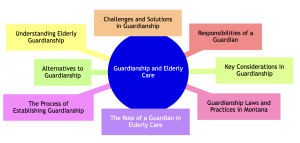Guardianship and elderly care are pivotal in ensuring the well-being and rights of older adults. As the population ages, more families and caregivers face the challenge of providing appropriate care while respecting the autonomy and dignity of their elderly loved ones. This article explores the complexities of guardianship, offering guidance on navigating legal processes, understanding responsibilities, and exploring alternatives to guardianship.
Key Takeaways
- Understanding Guardianship: Grasping the legalities and responsibilities involved in guardianship.
- Legal Processes: Insights into the step-by-step process of establishing guardianship, focusing on Montana’s specific laws.
- Guardian’s Responsibilities: Exploring the duties and ethical considerations of a guardian in elderly care.
- Challenges and Solutions: Addressing common challenges in guardianship and effective strategies to overcome them.
- Alternatives to Guardianship: Highlighting other options like trusts, powers of attorney, and representative payees.
Understanding Elderly Guardianship
Elderly guardianship involves a court-appointed individual taking responsibility for an older adult who can no longer make decisions independently. This section explains the concept, its purpose, and how it differs from related legal arrangements.
What is Elderly Guardianship?
- Legal Definition: A court-appointed role where an individual makes decisions for an elderly person unable to do so.
- Purpose: To protect the interests and well-being of the elderly who can’t manage their affairs due to health issues.
Guardianship vs. Conservatorship vs. Power of Attorney
- Guardianship: Focuses on personal and healthcare decisions.
- Conservatorship: Involves managing financial affairs.
- Power of Attorney: A legal document allowing someone to make decisions on behalf of another.
Key Considerations in Guardianship
Before opting for guardianship, it’s crucial to weigh several factors to ensure it’s the right decision for the elderly individual’s needs and circumstances. Guardianship is a significant legal step that involves taking over the decision-making power for someone who can no longer do it themselves. It’s a decision that should not be taken lightly, as it affects the life and rights of the elderly person.
Table 1: Factors to Consider in Guardianship
| Factor | Description |
| Elderly Individual’s Needs | Assess the specific care and decision-making needs of the elderly person. |
| Guardian’s Capability | Evaluate whether the prospective guardian is capable and willing to fulfill the responsibilities. |
| Legal Implications | Understand the legal obligations and limitations of guardianship. |
| Family Dynamics | Consider the impact on family relationships and the potential for conflicts. |
| Financial Considerations | Assess the financial implications, including the costs of legal proceedings and ongoing management. |
| Alternatives to Guardianship | Explore other options like power of attorney or living trusts. |
| Long-term Impact | Consider the long-term needs of the elderly person and the sustainability of the guardianship arrangement. |
The Role of a Guardian in Elderly Care
The guardian plays a pivotal role in the life of the elderly individual, encompassing a range of responsibilities. As a guardian, the primary focus is on ensuring the well-being and best interests of the elderly person. This involves making decisions about their personal care, healthcare, and financial matters. The guardian must act with the utmost integrity and responsibility, as they have a significant impact on the life of the elderly individual.
In terms of personal care, the guardian ensures that the elderly person’s daily needs are met. This includes decisions about living arrangements, dietary needs, and personal hygiene. Healthcare decisions may involve choosing medical treatments, managing medications, and coordinating with healthcare providers. Financial management is another critical area, where the guardian oversees the elderly person’s finances, including budgeting, paying bills, and managing investments. (1)
Responsibilities of a Guardian
- Personal Care: Ensuring the daily needs of the elderly person are met, including hygiene, nutrition, and living conditions.
- Healthcare Decisions: Making informed decisions about medical treatments and healthcare services.
- Financial Management: Overseeing the financial affairs, including budgeting, bill payments, and investment decisions.
The Process of Establishing Guardianship
Establishing guardianship is a legal process that requires careful adherence to state laws and regulations. This process is designed to protect the rights of the elderly individual while ensuring that the appointed guardian is suitable and capable of fulfilling their responsibilities.
Legal Requirements and Documentation
The process begins with filing a petition for guardianship in the appropriate court. This petition must clearly outline the reasons why guardianship is necessary and provide evidence of the elderly individual’s incapacity to make decisions. A key component of this process is a medical evaluation, which provides a professional assessment of the individual’s mental and physical capabilities.
Once the petition is filed, family members and other interested parties are typically notified, giving them an opportunity to support or contest the guardianship. This notification process ensures that the decision is made with transparency and consideration for all involved parties.
Step-by-Step Guide to Guardianship
- Filing the Petition: Submitting a formal request to the court for guardianship.
- Medical Evaluation: Providing a detailed assessment of the elderly individual’s health and cognitive abilities.
- Notice to Family Members: Informing relatives and other interested parties about the guardianship proceedings.
- Court Hearing: Attending a legal hearing where the judge reviews the case and hears from all parties.
- Judge’s Decision: The judge makes a decision based on the evidence and testimonies presented.
- Appointment of Guardian: If approved, the court officially appoints the guardian, granting them legal authority.
Guardianship Laws and Practices in Montana
Montana has specific laws and practices regarding guardianship that are important to understand for anyone considering this option in the state. These laws are designed to protect the rights of the elderly while ensuring that guardianship is used appropriately and effectively.
Montana’s guardianship laws emphasize the importance of preserving the dignity and autonomy of the elderly individual as much as possible. The state encourages limited guardianship arrangements, which grant guardians only the powers necessary to meet the specific needs of the elderly person, rather than full guardianship whenever feasible.
In Montana, the process involves:
- Understanding State-Specific Requirements: Familiarizing with Montana’s guardianship laws and procedures.
- Seeking Legal Advice: Consulting with an attorney experienced in Montana elder law.
- Tailoring Guardianship to Individual Needs: Considering limited guardianship options to preserve the elderly individual’s autonomy.
Responsibilities of a Guardian
The responsibilities of a guardian in elderly care are both comprehensive and sensitive. They require a deep understanding of the elderly individual’s needs and a commitment to acting in their best interests.
Duties and Ethical Considerations for Guardians
- Personal Care Management: Ensuring the elderly individual’s daily living needs are met, including hygiene, nutrition, and comfortable living conditions.
- Healthcare Oversight: Making informed decisions about medical care, treatments, and coordinating with healthcare professionals.
- Financial Stewardship: Managing the elderly person’s financial affairs responsibly, including budgeting, investments, and safeguarding assets.
A guardian must always prioritize the well-being and preferences of the elderly individual, maintaining a balance between providing necessary care and respecting their autonomy and dignity.
Challenges and Solutions in Guardianship
Guardianship, while necessary in many cases, can present various challenges. These can range from emotional and ethical dilemmas to logistical and financial hurdles.
Common Challenges Faced
- Emotional Stress: The emotional burden of making critical decisions for another person.
- Financial Strain: The costs associated with legal proceedings and ongoing management.
- Ethical Dilemmas: Balancing the elderly individual’s wishes with their best interests.
Strategies to Overcome Challenges
- Seeking Professional Advice: Consulting with legal and financial experts.
- Support Networks: Leveraging support from family, friends, and caregiver groups.
- Continuous Learning: Staying informed about the elderly individual’s condition and care options.
Alternatives to Guardianship
Before proceeding with guardianship, it’s essential to consider other less restrictive options that might be more suitable, depending on the circumstances.
- Power of Attorney: Assigning someone to make decisions without the need for court involvement.
- Living Trusts: Managing the elderly individual’s assets through a trust.
- Representative Payees: Appointing someone to manage government benefits.
Final Thoughts
Guardianship is a significant responsibility that requires careful consideration and informed decision-making. It’s essential to understand the legal requirements, the responsibilities involved, and the impact on the elderly individual’s life. Whether you’re considering guardianship in Montana or elsewhere, seeking professional advice and support is crucial to navigate this complex process effectively.
For those seeking information on Guardianship in Montana, Montana Elder Law offers expert legal services tailored to the unique needs of elderly individuals and their families. Their expertise in Montana elder law can provide invaluable assistance in making the best decisions for your loved ones.
References:
The Department of Justice, Guardianship, https://www.justice.gov/elderjustice/guardianship





